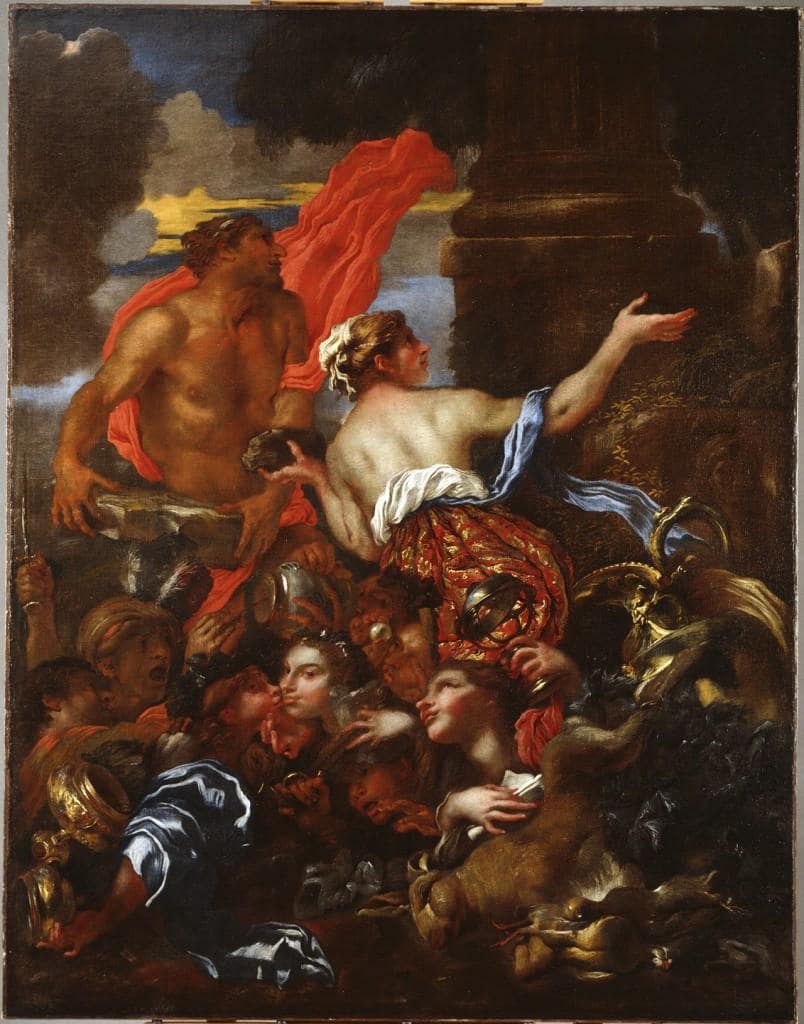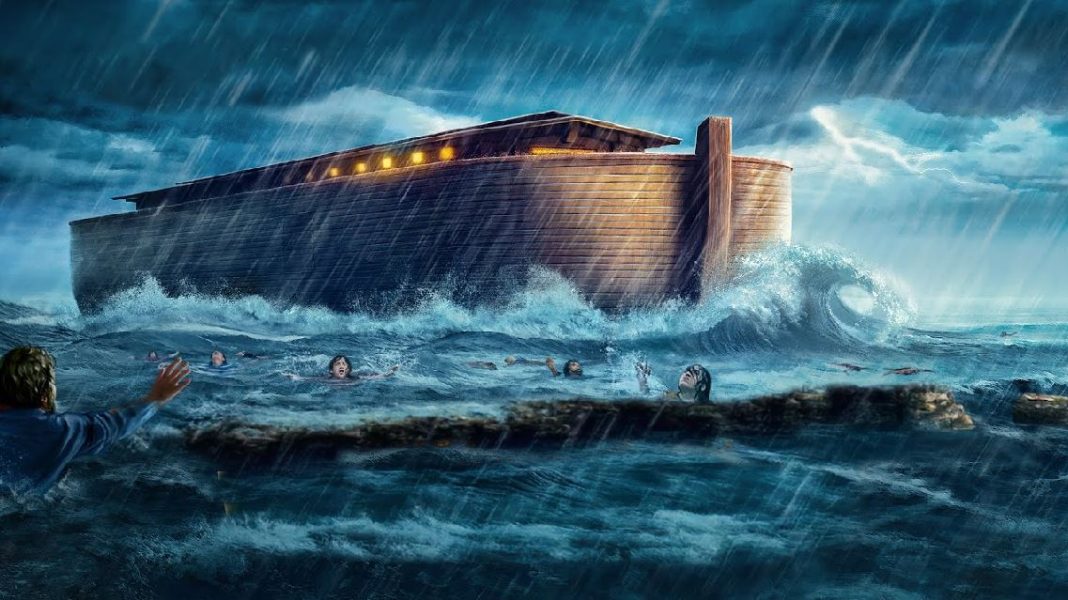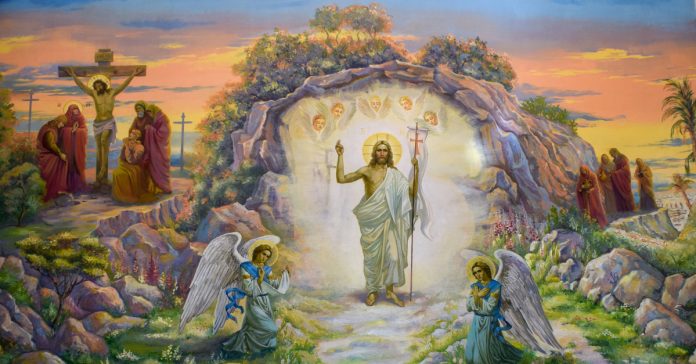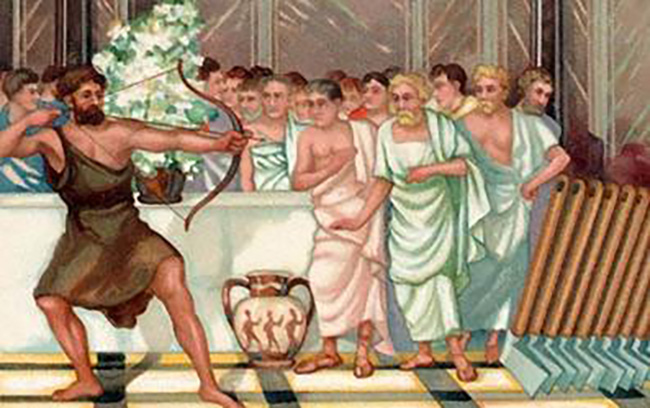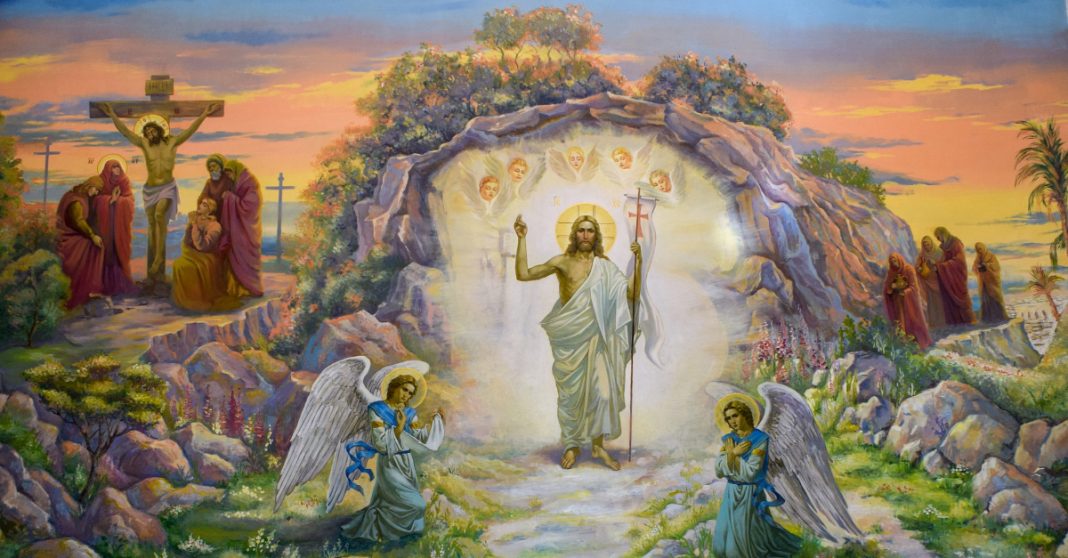This dramatic story from the Bible has sparked curiosity and debate for millennia. The image of a relentless downpour engulfing the Earth, a divine punishment for humanity’s sins, is both awe-inspiring and unsettling. But beyond the dramatic narrative, the story of the Great Flood raises profound questions about humanity’s relationship with the divine and the potential consequences of our actions.
This comprehensive exploration dives deep into the biblical account, examining the reasons behind the flood according to Genesis. We’ll delve into the descent of humanity, the divine disappointment that led to such a drastic response, and the selection of Noah as a beacon of hope.
But the story doesn’t end there. We’ll also explore the meticulous instructions for building the ark, a massive vessel that would become humanity’s lifeline amidst the coming deluge. We’ll witness the terrifying commencement of the flood, the relentless rains, and the rising water levels that submerged the world.
Intriguingly, the story of the Great Flood isn’t unique. Similar flood myths appear in cultures worldwide, from the Epic of Gilgamesh in Mesopotamia to Native American traditions. We’ll explore the possible reasons for this recurring theme, examining whether it reflects shared environmental experiences, a universal concern for morality, or a symbolic representation of renewal.
Join us on this captivating journey as we unpack the layers of the Great Flood story. Why did God flood the world? This article will shed light on the biblical narrative, explore its wider cultural context, and leave you pondering the enduring themes of humanity, morality, and the power of a fresh start.
A World Gone Wrong: Humanity’s Descent According to the Bible
The story of the Great Flood is a dramatic and enduring narrative within the Bible, sparking curiosity about humanity’s past and its relationship with the divine. But why did God flood the world, according to this foundational story? To understand the flood, we need to rewind to humanity’s early days, which brings us to explore other significant events in the Bible, such as the resurrection of Jesus, that have also sparked intense debate and analysis over the centuries.
The Book of Genesis paints a picture of a perfect creation. God meticulously crafted the world, separating light from darkness, land from sea, and filling it with diverse life (Genesis 1). The crown jewel of this creation was humanity, formed in God’s image and entrusted with dominion over the Earth (Genesis 1:26-28).
Initially, humanity lived in harmony with God and creation. But this idyllic state didn’t last. The familiar story of Adam and Eve’s temptation and expulsion from the Garden of Eden (Genesis 3) marked a turning point.
Fast forward generations, and according to Genesis 6:1-5, a darkness began to creep over humanity. The text states:
“When human beings began to multiply on the earth and daughters were born to them, the sons of God saw the daughters of humans and that they were beautiful; and they took any they chose as wives. At that time and later, when the sons of God came to the daughters of humans and had children by them—these were the heroes of old, warriors of renown. The LORD saw that the wickedness of humankind was great on earth, and that every intent of the human mind was always evil.”
Why did God flood the world according to this passage? The world had become consumed by wickedness and violence. Marriages between “sons of God” (often interpreted as angelic beings) and human women were seen as a corruption of God’s creation. Humanity’s thoughts and actions were consistently evil, leaving God with a heavy heart.
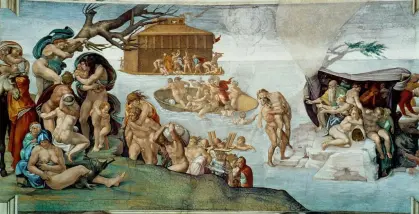
This section sets the stage for the dramatic events to come. With humanity spiraling out of control, the stage is set for a divine response, a response that would forever alter the course of human history. The seeds are sown for the question of why did God flood the world to be answered in the coming chapters of Genesis.
God’s Decision to Flood the World and Noah’s Favor
The Book of Genesis paints a somber picture in the wake of humanity’s descent into wickedness (Genesis 6:1-5). The question of why God flooded the world becomes even more pressing as we witness God’s reaction to the state of his creation.
The text of Genesis 6:6 is blunt: “The LORD regretted that he had made human beings on earth, and his heart was filled with pain.” This verse portrays a profound sense of disappointment from God. He had created humanity with such care and potential, only to see it squandered in violence and evil.
This divine disappointment wouldn’t translate to immediate annihilation, however. A glimmer of hope emerged in the form of Noah. Genesis 6:8 offers a stark contrast to the previous verses: “But Noah found favor in the eyes of the LORD.”
Why did God flood the world, yet choose to save Noah? The passage describes Noah as a righteous man, blameless in his generation (Genesis 6:9). He walked faithfully with God, a beacon of goodness in a world consumed by darkness.
Noah’s righteousness wasn’t simply passive; it manifested in his actions. The following verses (Genesis 6:13-16) detail God’s instructions to Noah – to build an ark, a massive vessel that would serve as a sanctuary during a coming flood. This act of obedience further solidified Noah’s favor with God.
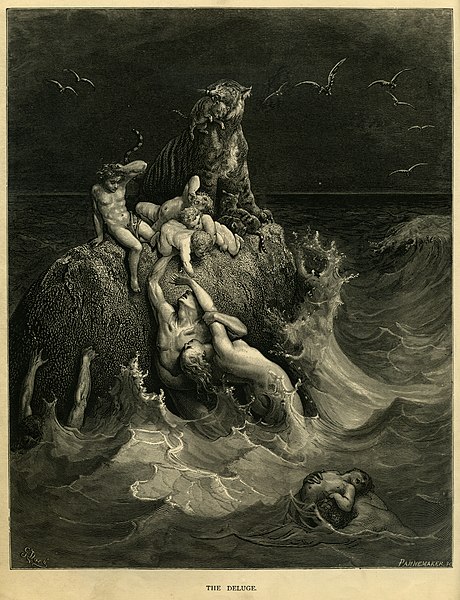
While the exact nature of God’s disappointment with humanity sparks theological debate, the narrative is clear: a world saturated with evil left God with no choice but to take drastic measures. Yet, amidst the despair, Noah’s unwavering faith offered a chance for salvation, a chance to rebuild a future where humanity wouldn’t necessitate the question of why God flooded the world ever again. The stage is thus set for the dramatic construction of the ark and the momentous events that would follow.
Exploring the Overlaps Between Divine Narratives and Extraterrestrial Theories
In addition to the profound theological implications of the Great Flood, some researchers have posited intriguing theories about potential extraterrestrial influences on biblical events. One such theory examines the idea of Aliens in the Bible, exploring whether ancient accounts of divine beings could be interpreted as encounters with otherworldly entities. This perspective opens a fascinating dialogue on how ancient scriptures might intersect with modern UFO lore and extraterrestrial hypotheses.
The Ark’s Blueprint: Preparing for the Deluge
With humanity’s fate hanging in the balance (why did God flood the world?), the Book of Genesis offers a dramatic shift – God’s chosen course of action and the hope it embodied. This section delves into the specific instructions God provided Noah for building the ark, a vessel that would become humanity’s lifeline amidst the coming deluge.
Genesis 6:14-16 details the divine blueprint: “So the LORD said to Noah, “I have decided to put an end to all flesh, because the earth is filled with violence because of them. I am about to destroy the earth by flood. Therefore, make yourself an ark of cypress wood; make rooms in it and coat it with pitch inside and out. This is how you are to make it: three hundred cubits the length of the ark, fifty cubits its width, and thirty cubits its height.”
The ark’s purpose was clear – to provide safe passage for Noah, his family, and a representative selection of animal life through the impending flood (Genesis 6:19). The specific dimensions, while not directly translatable to modern measurements, suggest a massive vessel capable of housing a significant number of inhabitants.
The choice of cypress wood offered several advantages. It was naturally resistant to rot and water damage, crucial for a vessel intended to weather a global flood. The additional instruction to coat the ark with pitch further enhanced its waterproofing capabilities.
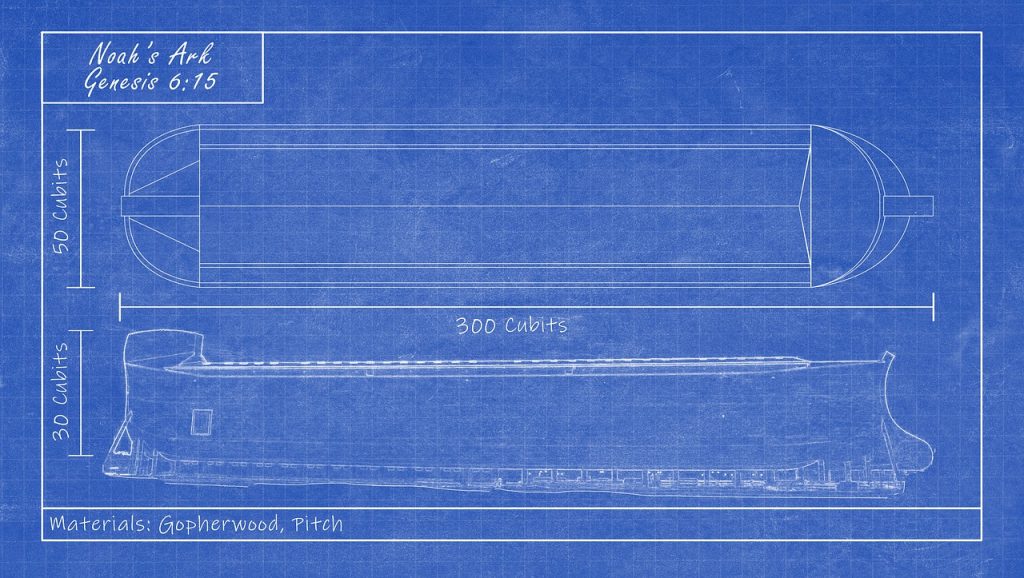
The detailed specifications in these verses raise intriguing questions. While the exact number of people and animals on the ark remains a subject of debate, the sheer scale of the project underscores the seriousness of the coming deluge. Building such a vessel would have been a monumental task, requiring immense skills, resources, and unwavering faith.
Why did God flood the world, yet offer salvation through the ark? This section doesn’t delve into the theological reasoning behind the flood, but it does highlight God’s plan for preserving life and offering humanity a chance to start anew. The intricate design of the ark becomes a symbol of hope amidst the impending devastation. With construction underway, the narrative prepares us for the dramatic events that would answer the question of why God flooded the world in a more literal sense.
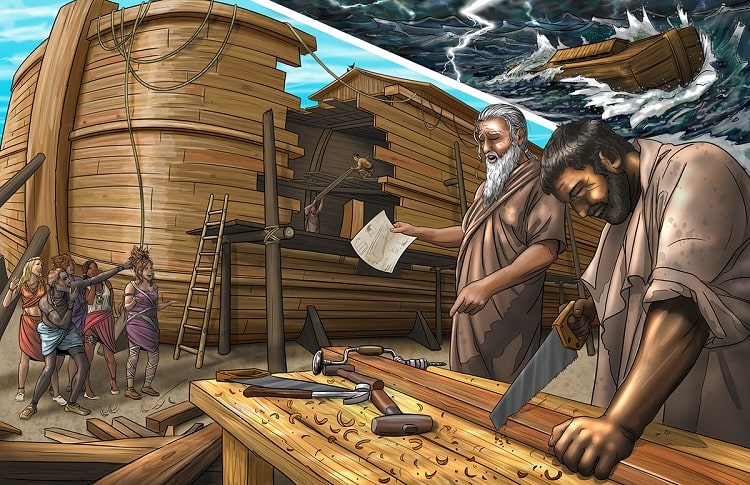
The Great Deluge: Rains Unleash and Waters Rise
The Book of Genesis ushers us into a scene of impending catastrophe. Having addressed the question of why God flooded the world through humanity’s descent into wickedness, the narrative now depicts the terrifying reality of the deluge itself. Genesis 7 chronicles the commencement of the flood, a relentless downpour that would reshape the world.
The text paints a vivid picture: “On that very day all the fountains of the great deep burst forth, and the floodgates of the heavens were opened” (Genesis 7:11). This imagery evokes a complete breakdown of natural barriers. The very foundations of the Earth seemingly cracked open, spewing forth a torrent of water. Simultaneously, the heavens themselves became a source of relentless downpour.
The intensity and duration of this rainfall are staggering. Genesis 7:12 states, “And rain fell on the earth forty days and forty nights.” For nearly six weeks, the world was battered by an unending deluge. Imagine the rising water levels, relentlessly consuming the land, transforming familiar landscapes into a vast, unforgiving sea.
Why did God flood the world to such an extent? The sheer scale of the flood underscores the severity of humanity’s transgressions. It was a physical manifestation of the divine judgment, a complete cleansing of a world corrupted by violence and evil.
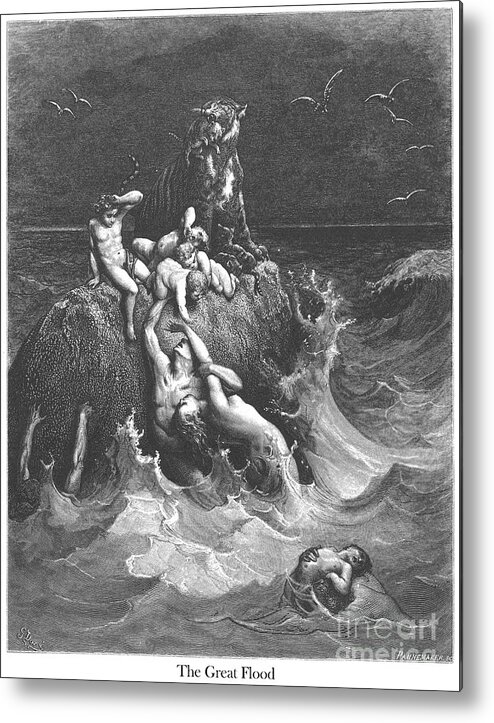
The narrative doesn’t dwell on the despair of those outside the ark. Instead, it focuses on Noah and his family, safely sequestered within the vessel. We can only imagine the churning emotions – fear of the unknown, the deafening roar of the storm, and perhaps a glimmer of hope for a future beyond the floodwaters.
The rising water levels are depicted in stark terms. Genesis 7:17-18 describe how “the waters rose and covered the mountains to a depth of twenty cubits above them. And all the high mountains under the entire sky were submerged.” The world, once a haven for humanity, became an unrecognizable aquatic expanse.
This section serves as a turning point in the story. The question of why God flooded the world has been answered through the unleashing of this devastating deluge. Now, the narrative shifts towards the ark’s survival amidst the rising waters and the eventual hope of a new beginning.
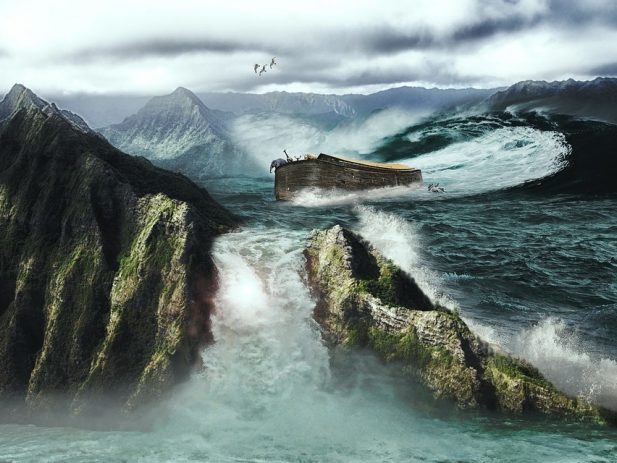
A World Submerged: Humanity’s Fate and the Ark’s Survival
The Book of Genesis paints a harrowing picture of a world succumbing to the wrath of the flood. Having witnessed the relentless downpour in the previous section, we now confront the devastating consequences – the complete submergence of the Earth. This section explores the contrasting fates of those outside the ark and the vessel’s successful navigation of the floodwaters.
The narrative in Genesis 7:19-20 is stark: “The waters rose and rose greatly on the earth, and all the high mountains under the entire sky were submerged. The waters rose more than twenty cubits above the mountains, covering them completely.” This imagery leaves no room for doubt – the Earth has been transformed into a vast, unforgiving sea. The very mountains, once considered places of safety, are now submerged beneath the relentless torrent.
Why did God flood the world to such an extent? The complete submergence serves as a powerful symbol of divine judgment. It signifies the complete eradication of the world humanity had corrupted. The text doesn’t dwell on the fate of those outside the ark, but the implication is clear – a consequence for the rampant wickedness that had plagued humanity.
While the narrative doesn’t offer graphic details, the gravity of the situation is undeniable. This section serves as a stark reminder of the consequences of defying God’s will.
In stark contrast to the devastation outside, the ark emerges as a beacon of hope. Genesis 7:18 emphasizes, “But the ark floated on the surface of the water.” Despite the rising waters and the relentless storm, the vessel remained buoyant, a testament to God’s protection of Noah and the life entrusted to him.
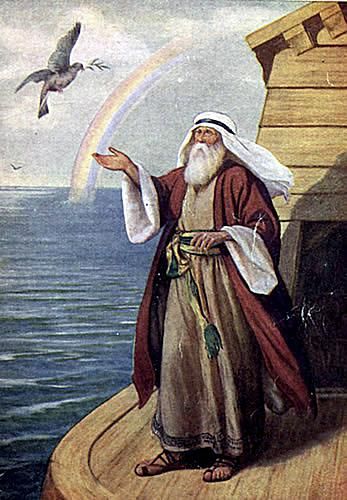
The narrative doesn’t delve into the specifics of the ark’s navigation. However, its successful traversal of the floodwaters underscores the ingenuity of its design and the unwavering faith of its occupants. Imagine the days, perhaps even weeks, spent adrift on a seemingly endless ocean. Yet, Noah and his family persevered, sustained by the promise of a new beginning.
This section marks a pivotal moment in the story. The question of why God flooded the world has been answered through the complete submergence of the Earth. Now, with humanity outside the ark presumably perished, the narrative shifts towards the eventual receding of the waters and the possibility of a world reborn.
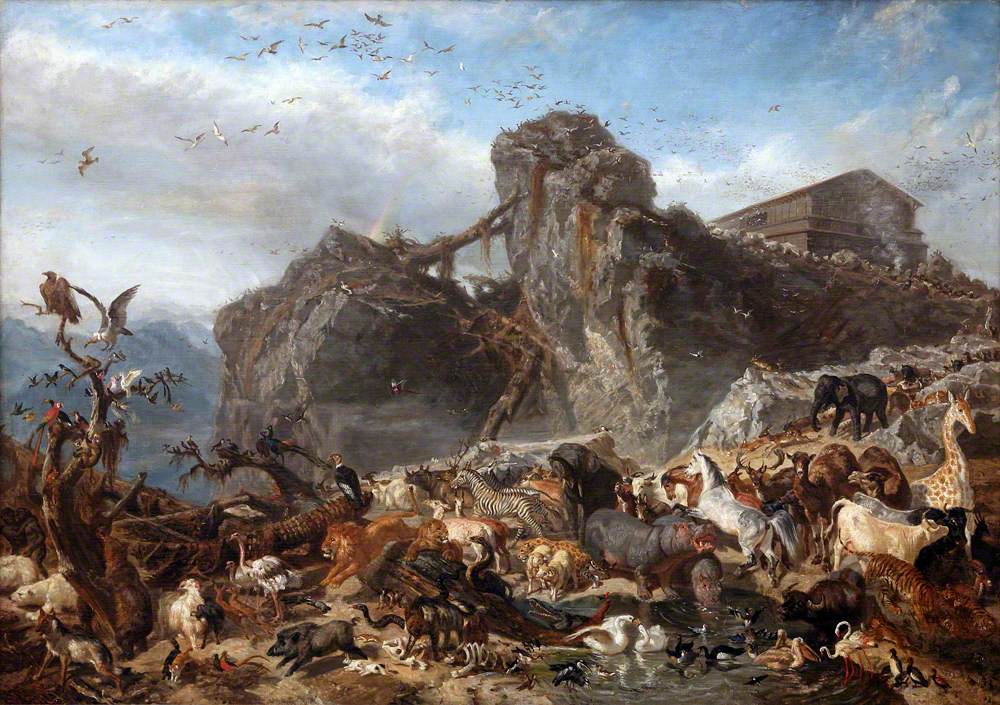
A New Beginning: The Waters Recede and a Covenant is Formed
The Book of Genesis ushers us into a scene of cautious optimism. Having witnessed the devastating consequences of the flood (why did God flood the world?), we now see the beginnings of a new chapter. This section explores the gradual receding of the floodwaters, the tentative steps towards a new world, and the establishment of a lasting covenant between God and humanity.
Genesis 8:1-3 details the slow but steady retreat of the waters: “But God remembered Noah and all the living creatures and the livestock that were with him in the ark. And God caused a wind to blow over the earth, and the waters subsided. The fountains of the deep and the floodgates of the heavens were sealed up, and the rain stopped falling from the sky. The water gradually receded from the earth.”
Imagine the immense relief felt by Noah and his family as the relentless downpour ceased and the floodwaters began to recede. A sense of hope, perhaps tempered by the devastation witnessed outside the ark, would have undoubtedly filled their hearts.
The narrative in Genesis 8:8-14 describes Noah’s cautious exploration of the newly revealed world. He first sends out a dove, a symbol of peace, to see if dry land can be found. The dove’s return with an olive branch (Genesis 8:11) signifies a world slowly emerging from the watery depths. A second attempt with the dove confirms the presence of dry land (Genesis 8:12). Finally, after forty days, Noah cautiously removes the ark’s covering and sees that the earth has dried up (Genesis 8:13-14).
With the world finally habitable again, God instructs Noah and his family to leave the ark (Genesis 8:15-18). This marks a pivotal moment – humanity, albeit a select few, is given a second chance.
Why did God flood the world, yet offer humanity a chance to rebuild? The answer lies in the following verses (Genesis 9:8-17). God establishes a covenant with Noah, a promise never to destroy the Earth by flood again. This covenant is symbolized by the rainbow, a beautiful reminder of God’s mercy amidst judgment.
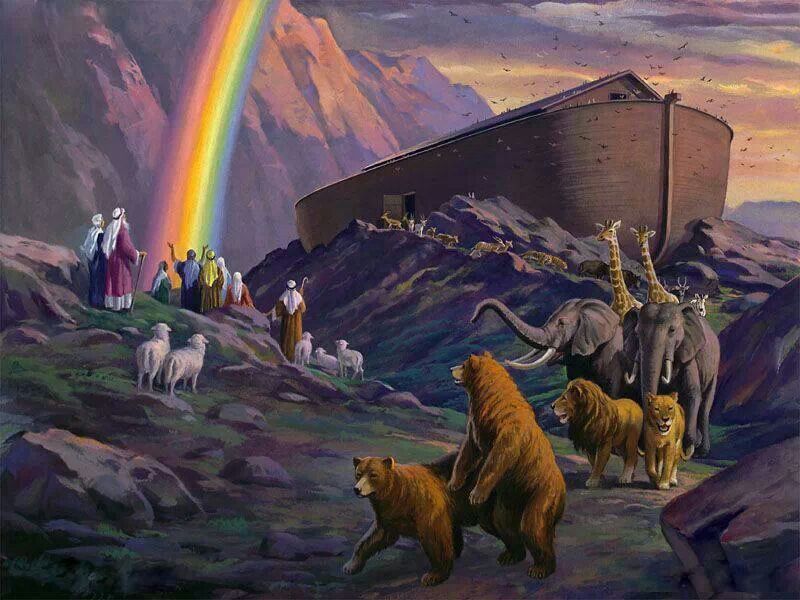
This section offers a sense of closure to the narrative of the flood. The vast expanse of water that answered the question of why God flooded the world has receded, revealing a world forever altered. Humanity, forever marked by the memory of the flood, is entrusted with the responsibility of repopulating the Earth and living according to God’s will. The lasting covenant signifies a new beginning, a chance to learn from the past and build a future free from the rampant wickedness that necessitated such a drastic response.
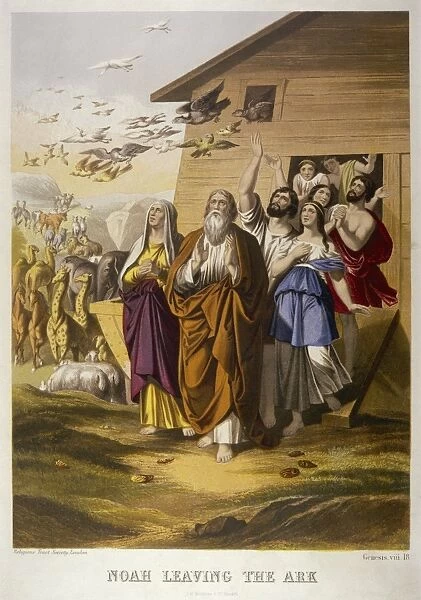
Frequently Asked Questions (FAQs)
1. Why did God flood the world according to the Bible?
According to the Bible, God flooded the world due to the widespread wickedness and corruption of humanity, sparing only Noah and his family for their righteousness.
2. How did Noah find favor with God?
Noah found favor with God by living a righteous and blameless life, standing out as faithful in a corrupt and violent world.
3. What was the purpose of the ark?
The ark was built to preserve Noah, his family, and pairs of every animal species from the flood, ensuring the continuation of life on Earth.
4. Are there other cultural flood myths similar to Noah’s story?
Yes, many cultures have flood myths, such as the Epic of Gilgamesh in Mesopotamian mythology and Deucalion in Greek mythology, all sharing themes of divine judgment and survival.
5. What is the significance of the rainbow in the story?
The rainbow symbolizes God’s covenant with humanity, promising never to destroy the Earth with a flood again, serving as a reminder of God’s mercy and the hope for a new beginning.
Echoes of the Flood: Similar Myths Across Cultures
The story of the Great Flood in the Bible is a captivating and enduring narrative, but it’s far from unique. Flood myths appear in a remarkable number of cultures worldwide, prompting the question – why did God flood the world, according to these diverse traditions?
The Mesopotamian Epic of Gilgamesh, dating back to around 1800 BCE, offers a striking parallel. This epic poem recounts the tale of Utnapishtim, a righteous man warned by a god about an impending flood. Utnapishtim builds a massive boat and survives the deluge, much like Noah in the biblical account.
Similar flood stories can be found in Greek mythology (Deucalion and Pyrrha), Hindu mythology (Manu), and even Native American traditions. While the specifics vary, the core theme of a devastating flood and a chosen survivor remains constant.
Why did God flood the world according to these diverse cultures? There are several possible explanations:
- Shared Environmental Experiences: Large floods, though uncommon, have likely impacted many civilizations throughout history. These experiences could have been incorporated into mythology as a way to explain and make sense of such catastrophic events.
- Universal Moral Lessons: Flood myths often depict the flood as a consequence of human transgression. This recurring theme suggests a universal human concern with morality and the potential consequences of violating societal norms.
- Symbolic Renewal: The flood, despite its destructive nature, can also be seen as a symbol of cleansing and rebirth. The receding waters leave behind a world renewed, offering the potential for a fresh start.
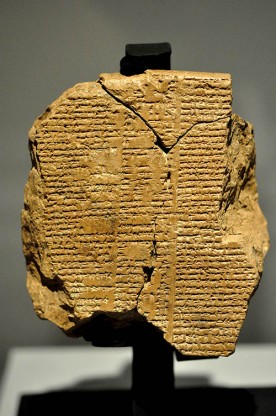
The presence of flood myths across cultures highlights the enduring human fascination with natural disasters, morality, and the cyclical nature of life. While the specific details of why God flooded the world may vary, these stories offer a window into humanity’s shared experiences and anxieties.
It’s important to note that the existence of these flood myths doesn’t necessarily imply a historical flood event that all cultures are referencing. These stories could have arisen independently or been influenced by cultural exchange.
The exploration of flood myths in various cultures allows us to appreciate the diversity of human storytelling while recognizing the underlying themes that resonate across time and geography.
